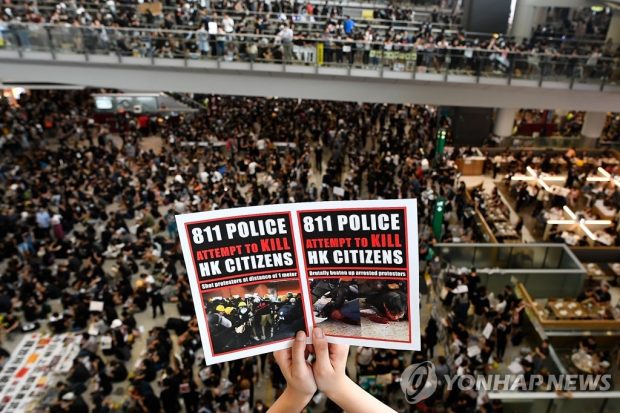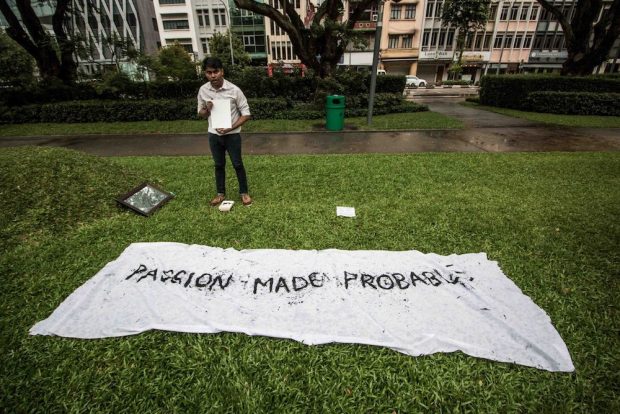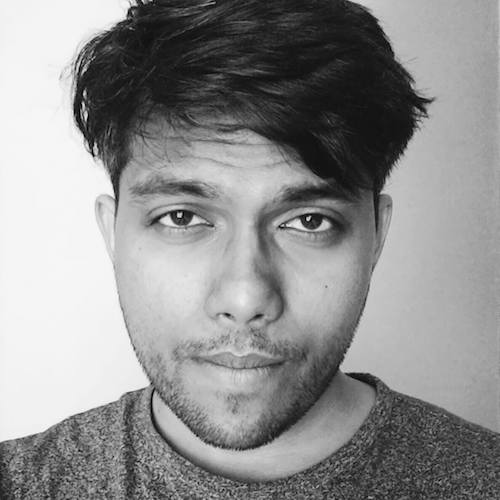홍콩시위를 바라보는 싱가포르의 두가지 시선···’대규모 시위’ vs ‘1인 예술시위’

[아시아엔=아이반 림 아시아기자협회 제2대 회장, 전 <스트레이트타임스> 선임기자] 싱가포르의 시민운동가 졸로반 웸(Jolovan Wham)은 2016년 경찰 허가 없이 ‘불법 집회’를 연 혐의로 유죄 판결을 받았다. 당시 집회 주제는 ‘시민 불복종과 사회운동’이었다. 해당 집회에는 홍콩의 친민주주의 학생 지도자 조슈아 웡(Joshua Wong)도 원격으로 참여했다. 싱가포르 연사들 중엔 프리랜스 기자 커스틴 한(Kirsten Han)과 예술가 겸 시민운동가 실란 팔레이(Seelan Palay)가 있었다.
자매도시인 홍콩에서 이어지는 최근 잇단 시위는 싱가포르 국민들에게 ‘찬탄’과 ‘주의’를 동시에 일으키고 있다. 싱가포르의 탄바바(Tan Bah Bah) 기자는 젊은 시위자들의 열정, 용기와 목적의식에 찬사를 보냈다. 그는 <인디펜던트싱가포르>의 온라인 주간 사설에서 “권리와 자유에 대한 교묘한 침해에 대항하는 그들의 정당한 싸움은 많은 싱가포르인의 존경을 얻었다”고 말했다.
그가 인용한 설문조사에 따르면 이에 참여한 싱가포르인 1000명 중 3/4 이상이 범죄인 인도 법안에 대항해 발생한 홍콩시위를 지지한다고 답했다. 대규모 시위에 놀란 홍콩정부는 홍콩 내 탈주자를 중국에게 넘기는 행위를 허용하는 범죄인 인도 법안을 무기한 연기하겠다고 밝혔다.
홍콩정부가 방어적 태도를 취하자 시위대는 △범죄인 인도 법안 완전 철회 △캐리 람 홍콩 행정장관 사퇴 △경찰의 강경 진압에 대한 독립적 조사 등을 강력히 요구했다. 하지만 이에 정부가 기존 입장을 고수하자 강경파 시위자들은 최루탄과 고무탄을 발포하며 진압하는 경찰에게 강렬하게 저항했다.

진압경찰과 충돌하면서 시위는 폭력적으로 변했다. 몇몇 시위자들은 국회의사당을 점거하고 중앙인민정부 주홍콩연락판공실에 있는 중국 문장(紋章)을 검은색 페인트로 훼손했다.
이에 싱가포르의 여론은 우려를 나타내기 시작했다. “홍콩인들은 선을 넘었다. 불만을 표출할 권리는 있지만 그 과정에서 법은 지켜야만 한다”고 싱가포르의 한 노인은 말했다.
싱가포르인들은 시위자들이 벌이는 제로섬 게임도 이해하지 못하고 있다. 국내 산업 및 교통수단을 방해하는 것은 물론, 시위자들은 외국인이 겪을 불편에 대한 고려 없이 공항에서 농성을 벌여 세계의 이목을 끌려고 했다.
캐리 람 행정장관은 대화를 제안했으나, 시위 주모자들은 이를 함정이라며 거부했다. 홍콩과 마찬가지로 싱가포르도 영국의 식민 지배와 내정 간섭을 경험했다. 싱가포르도 1950년대와 1960년대에 자주독립을 위해 싸우는 과정에서 노동자 파업과 정치 불안을 겪을 대로 겪었다. 싱가포르인들은 이같은 역경을 극복하는 과정에서 ‘안정’과 ‘절제’의 중요성을 배웠다.

50년 넘는 기간 동안 싱가포르인은 정치안정에 대한 어떤 위협에 대해서도 법을 앞세워 일체 용납하지 않고 가혹하게 대응하는 독재정부의 지배를 받고 있다. 앞에 언급한 졸로반 웸의 동료 시민운동가인 실란 팔레이는 2017년 싱가포르 국회의사당 앞에서 싱가포르 총리를 역임했던 리콴유의 政敵인 치아 시 포 박사가 재판 없이 32년 구금형을 받은 것에 항의하는 ‘1인 예술시위’를 벌이다가 체포당했다.
싱가포르 집권 인민행동당의 재빠른 조치는 전형적인 일벌백계에 의한 탄압이다. 이같은 싱가포르의 상황에 맞서 탄바바 기자는 배짱과 용기 두둑한 싱가포르인들이 더 많이 홍콩인들의 발자취를 따르길 기대하고 있다.

싱가포르인들은 ‘일국양제’ 하에서 살아가는 홍콩인들이 왜 정부측과 합의를 보지 못하는지 궁금해 하고 있다. 홍콩인들이 더 예민해서일 수도 있다. 관대하고 방임적인 부모 밑에서 자란 아이 마냥, 엄격하고 험악하기까지 한 부모한테 넘겨지는 상황을 못 견디는 것이다. 홍콩인들은 자유와 민주주의를 물질적 후생보다 더 중요하게 여기기 때문이다.
반면 실리적인 싱가포르인들은 생계를 비롯한 물질적 안정을 우선시한다. 싱가포르인들은 정부와의 암묵적인 계약을 신뢰하며 더 많은 월급을 주는 직장, 저렴한 주택과 자식들 키우기에 안전하고 쾌적한 환경을 위해 자신들의 자유가 제한 받는 것을 감수하고 있다. <번역 이진규 기자>
아래는 영어 원문 전문.
In 2016, Singaporean civic activist Jolovan Wham was found guilty of organising an illegal public assembly without a police permit. The theme of the indoor conference was “Civil Disobedience and Social Movements”. There was a Hong Kong connection: Joshua Wong, a pro-democracy student leader who spoke via video. Singapore speakers included freelance journalist Kirsten Han and artist/activist Seelan Palay.
The current prolonged protests in Hong Kong, a sister city, have won both praise and caution. “Hats off” to the passion, courage and sense of purpose of the young protesters, chimed fellow journalist Tan Bah Bah. “Their legitimate fight for rights and freedom against subtle encroachments have commanded the respect of many Singaporeans,” he wrote in his weekly column in the Independent-Singapore new site.
He cited a black box survey, which showed more than three-quarters of 1,000 Singaporeans polled backed the Hong Kong demonstrations that was sparked by opposition to the government’s Extradition Bill. In the face of massive demonstrations, the authorities announced it was shelving indefinitely the controversial Bill which would allow fugitives in the safe haven to be handed into Chinese custody.
Sensing the government’s defensive position, the protesters pressed their demands?withdrawal of the Bill, resignation of Chief Executive Carrie Lam and an independent probe into police brutality. As the government digged in its heels, hardliners took to defying and clashing with the police riot squad firing tear gas and rubber bullets.
As the protest turned violent, some protesters went on to ransack the Legislative Council building and vandalised the Beijing Liaison Office where the red China emblem was splashed with black paint.
At this point, sentiments in the city-state began to shift. “The Hongkongers have gone too far,” said an elderly Singaporean. “While they have every right to voice their grievances, they must respect the law of the land.”
Singaporeans are also finding it difficult to fathom the zero-sum gambit of the protest movement. On top of disrupting local businesses and transport services, the protesters staged airport sit-ins to draw international attention oblivious of the inconvenience caused to foreigners.
Calling it a trap, protester organisers have rejected Ms. Carrie Lam’s latest offer for dialogue. Like Hong Kong, Singapore had gone through British colonial rule and political tutelage. In fighting for self-rule, the Republic has also seen its share of labour strikes and political unrest in the 1950s and 60s. That baptism of fire, struggle and hardships had taught the people to value stability and moderation.
For more than 50 years, Singaporeans have been ruled by an authoritarian government that wields a set of draconian laws against any threats to political stability. Seelan Palay, Jolovan Wham’s fellow activist, was arrested in 2017 when he staged a one-man artistic protest in front of Parliament House, decrying the 32-year detention without trial of opposition politician Dr. Chia Thye Poh under the late Prime Minister Lee Kuan Yew.
Such a swift crackdown by the People’s Action Party government is the classic “wringing the neck of a chicken to frighten monkeys”. Hence, my fellow journalist Tan Bah Bah’s desire to see more gutsy Singaporeans follow in the footsteps of Hongkongers.
Singaporeans wonder why Hongkongers living under a “one-country, two systems” system seem unwilling or unable to strike a compromise with the authorities. Perhaps Hongkongers have keener sensibilities. Like a child nurtured by a tolerant and care-free parent, they could not bear to see themselves being given up to a stern and forbidding one. They put a higher premium on freedom and democracy than material welfare.
In contrast, pragmatic Singaporeans give more priority to material things like to bread-and butter issues. Under an unwritten compact with the government, Singaporeans have been willing to accept limitations on freedoms in return for having good-paying jobs, affordable housing, safe and pleasant environment to bring up their children.





